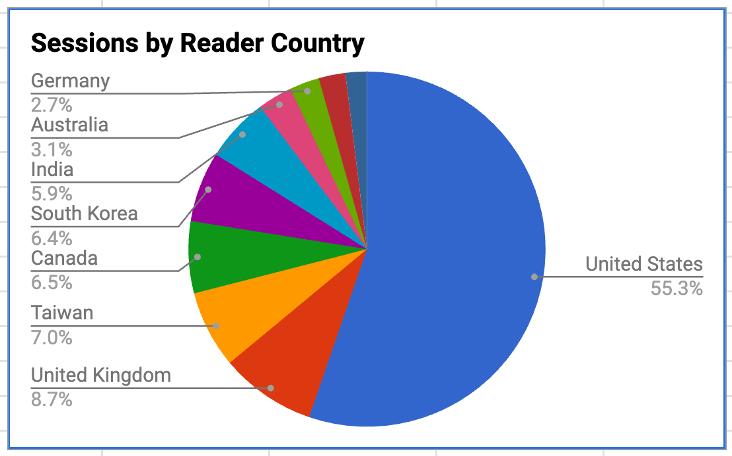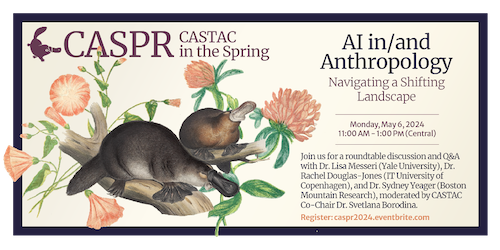
Welcome to our annual wrap-up of CASTAC’s 2024 activities! We are grateful to all of you, our readers, for engaging with our content this year and we look forward to sharing more pieces on the anthropology of science and technology in 2025.
Platypus: The CASTAC Blog
Katie Ulrich concluded a two-year term as Managing Editor at Platypus, and we’re excited to welcome the incoming Managing Editor for 2025-26, longtime Contributing Editor Kim Fernandes!
The 2024 Platypus team was the largest yet, with twenty-two Contributing Editors and six Multimodal Contributing Editors spanning multiple continents. Stay tuned for our 2025 Welcome Post in January, where we will introduce next year’s team.
In 2024, we published 61 posts and almost half were published in a second language (including Portuguese, Spanish, Korean, Serbian, Hindi, German, and Burmese), joining posts from previous years in Russian, Mandarin, Urdu, Kiswahili, Khmer, and Swedish. Multimodal Contributing Editors produced posts in new and creative formats, including a tarot deck for the biotechnological age, a series of audio ethnographies, a comic, an illustrated bed-time story dreamscape, an ethnographic-visual storyboard, and a DIY manual for feminist STS figurations.
Platypus’s readers continue to come from around the world–specifically, 169 different countries. This year, a little over half of our total readership came from the United States. The nine largest groups of readers from outside of the US were from the United Kingdom, Taiwan, Canada, South Korea, India, Australia, Germany, Brazil, and the Netherlands.

For the period between October 19, 2023, and October 17, 2024.
Our readers find or arrive at posts from a variety of sources. Among our blog referral list were forty-seven unique university learning management systems (e.g., Blackboard, Canvas, and Moodle), suggesting that Platypus is being assigned and/or recommended to students for learning at approximately forty-seven universities.
Reflecting Platypus’s commitment to accessibility, in 2024 we continued to offer almost all posts as audio recordings available for listening on Platypod. This feature started in 2022 with the help of Angela VandenBroek, who continues to provide technical support and guidance.
Platypus’s sustained growth has taken place thanks to its dedicated and diverse team, who are committed to deliver quality and nuanced posts from different parts of the globe. The work of our new Public Relations manager Natalia Orrego amplified Platypus’s presence online and facilitated the growth of our audience. We thanked outgoing Public Relations manager Naomi Zucker for her many years of dedicated service!
Finally, the top ten most popular posts published in 2024 were the following:
- Recipes of Resistance: Global Digital Gastro-solidarity for Palestine
- On Algorithmic Divination
- Belly Versus Bin: How Digital Autoethnography Brought Me Back From the Brink of Disordered Eating
- Funeral for an Embryo
- On Disability, Infrastructure, and Shame
- Trolling: Breaking Rules, Poking Fun, or Just Outright Harassment?
- Platypus in 2024
- Cards and Codes: Spirituality and Magic in the (Bio)technological Era
- Algorithmic Imaginations in Agriculture: Automation?
- Waves of Well-being: Surfing at the Shaka Surf Club in Kodi Bengre, India
Platypod
2024 was the third year of Platypod, the official CASTAC Podcast, with Rebecca Carlson taking over for Ana Carolina de Assis Nunes as producer. Platypod features original episodes as well as recordings of blog posts read by authors. In September Ana posted an interview with Savannah Mandel, who writes about outer space from an anthropological perspective. Rebecca also released two new original podcasts, the first focused on the implications of multimodal methods for ethnographic data collection. This episode features conversations with three scholars working with these methods, Rachel Douglas Jones, Rine Vieth, and Kara White. The second episode is a personal reflection on the complexities of ethnographic representation, friendship, and motherhood, in conversation with another podcast producer about the work of making podcasts. Upcoming episodes will focus on topics like sonic ethnography, including a live sound experiment.
Prizes
Diana Forsythe Prize
2024 marks the 26th year in which CASTAC has presented the Diana Forsythe Prize in partnership with the Society for the Anthropology of Work (SAW). The prize was created in 1998 to celebrate the best book or series of published articles in the spirit of Diana Forsythe’s feminist anthropological research on work, science, and/or technology, including biomedicine. It is awarded annually at the meeting of the American Anthropological Association by a committee consisting of one representative from SAW and two from CASTAC. This year’s selection committee consisted of Noah Tamarkin (chair), Kalindi Vora, and Alex Blanchette.
We received thirty-one nominations for the prize. This year’s winner was Tabula Raza: Mapping Race and Human Diversity in American Genome Science, by Duana Fullwiley (University of California Press).
David Hakken Graduate Student Paper Prize
Since 2015, CASTAC has awarded a graduate student paper prize in recognition of excellent work by rising scholars. In 2016 the prize was renamed in honor of the memory of David Hakken, for his pioneering work at the intersection of ethnography and cyberspace. The prize is awarded to a paper that exemplifies innovative research at the intersection of anthropology and science and technology studies, demonstrating theoretical sophistication and an appreciation of the methodological challenges facing scholarship in the anthropology of science and technology. This year’s David Hakken Prize Committee consisted of Katie Ulrich, Matthew R Webb, and Spencer Kaplan.
This year’s winner is Timothy Y. Loh (Massachusetts Institute of Technology) for his paper “An Expanded Istifada: Cochlear Implants and Regulating Communication for Deaf Jordanians.” Timothy’s paper examines the diagnostic and pedagogical practices of cochlear implant experts working with deaf children in Jordan. Through carefully crafted ethnographic analysis of multi-modal therapeutic dynamics among speech therapists, audiologists, and their patients, the paper reveals the operation of narrow conceptions of language and disability, including the persistence of a speech-centric ethos and a techno-utopic imaginary of implant technologies. The paper pays close attention to paradoxical moments in clinical spaces where such narrow conceptions are reproduced but also contested by patients and their parents. The committee appreciated the rich ethnographic prose accompanied by the well-organized and reader-friendly analytical suggestions, as well as the paper’s synthesis of supporting literature and concepts from linguistic anthropology, STS, and disability studies.
The honorable mention is awarded to Aaron Su (Princeton University) for his paper, “The Dilemma of ‘Self-Sufficiency’: Indigenous Agriculture and the Limits of Scientific Collaboration in Settler-Colonial Taiwan.” Aaron’s paper considers contradictory and contested notions of “self-sufficiency” among state agricultural researchers and Indigenous farmers in Taiwan, amid precision-agriculture efforts to promote national food security. Drawing on rich, intentional ethnography among these actors, the paper theorizes the tensions between national agricultural self-sufficiency, advanced through monocropping and productivism, and ecological self-sufficiency advanced through Indigenous agricultural practices. The committee was compelled by the paper’s extensive engagement with literatures around ecological knowledge and agricultural geopolitics, as well as the precise and evocative storytelling through which the paper unfolds.
CASPR (CASTAC in the Spring)

This year we hosted the third annual CASPR virtual event. This year’s theme was “AI in/and Anthropology: Navigating a Shifting Landscape.” We were very fortunate to have guests Lisa Messeri, Rachel Douglas-Jones, and Sydney Yeager for a roundtable moderated by senior CASTAC co-chair Svetlana Borodina. The forum then invited questions and answers, as well as individual breakout rooms on subjects such as AI and reality, anthropology and/of AI policy, and AI and in/equality. The forum was well attended with around 180 participants. We will release the roundtable portion of this event as an episode on Platypod soon.
CASTAC Invited Lecture at the AAA Meeting
In an effort to highlight the contributions of scholars working at the intersection of anthropology and science and technology studies, CASTAC’s annual Invited Lecture at the AAA meeting featured Dr. Lydia Gibson. She presented a talk titled, “Of lens and space: ritual, techne, and geodesic abstraction.” Dr. Gibson’s research involves forest use, Caribbean ecologies, postcolonial theory, and the materialities of environmental actions, as well as data practices such as GIS, remote sensing data, and ecological methods. Dr. Gibson works closely with local Maroon communities in Jamaica to monitor ecosystems, working with and against exploitation, misuse, and colonization of traditional and indigenous knowledge, and her work is of extreme importance in a time of severe weather events, including in places like Tampa where the AAA meeting was hosted this year.
Thank You
We thank you for reading, listening, and engaging with our content and hope to connect with you again in 2025. We also thank outgoing Public Relations manager Naomi Zucker and outgoing CASTAC Co-Chair Svetlana Borodina for their years of vital service. For the 2025 term Nicole Taylor will take over as senior Co-Chair, with Ana Carolina de Assis Nunes as rising Co-Chair.
Note
Posts published between October 19, 2023 and October 17, 2024; we collect this data every year in October for our annual report to the AAA.
CASTAC is an entirely volunteer-run organization with an unpaid staff of more than twenty people. As we do not directly collect dues from our members, our operating budget of $300 per year (for costs associated with the blog website, etc.) comes from a portion of the dues paid to the General Anthropology Division of the American Anthropological Association.
Our community and our ambition to support it are growing faster than our budget! If you enjoy the work CASTAC does, consider donating and volunteering (watch for calls for applicants on the listserv). All donations will go directly to CASTAC to support our existing programs and develop new ones! Consider supporting CASTAC by making a donation using this link and following us on social media on @CASTAC_AAA.






